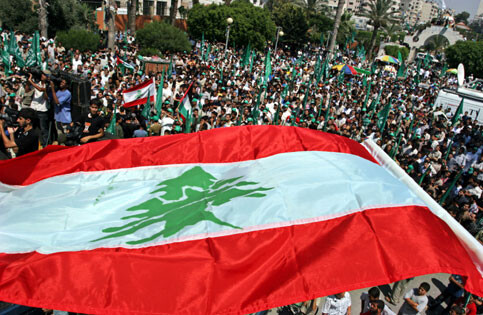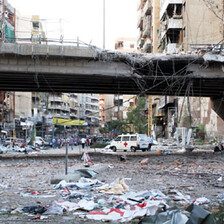Chicago, United States 15 July 2006

A Hamas supporter holds a Lebanese flag during a protest against Israel’s military offensive in Lebanon and Gaza during a rally after Friday prayers in Gaza City July 14, 2006. (MaanImages/Wesam Saleh)
If I could stop time I would, stop everything from moving forward, not for long, just for a few moments, just long enough to let out the scream that is growing in my lungs making it difficult to breathe.
Here I am in Chicago on the hottest day of the year so far, an overcast day where the air is like a swimming pool, where the humidity is so thick you can smell it, feel it wrap around your skin as soon as you step outside. This morning I walked outside into the humid air and thought, immediately: Beirut.
Beirut with your cloud of smog so thick you can se it hanging low on summer days, Beirut with your Mediterranean heat, Beirut with your drivers taking the wrong way down one-way streets at rush hour, Beirut where, on days like this, I have friends who would rather take me to Dunkin’ Donuts than to the beach, Beirut that makes me crazy with all the people insisting on using their beautiful English and French when all I want to do is practice my poor foreigner’s Arabic.
Meanwhile, in Chicago there is just enough sun to imitate a Beirut afternoon. In Chicago I spend all morning trying to call Beirut, listening to the sound of broken phone lines. In Chicago I spend all morning flipping from one news story to the next and find none that say anything new. They feature the names of the captured Israelis at the top and the numbers of dead Lebanese and Palestinians at the bottom.
I try again to call. My phone card doesn’t work. I call customer service and yell at the poor woman on the other end of the line.
In Chicago I order coffee at a café and stare at everyone with accusing eyes. What headlines have you read or not read, which civilian death is your silence responsible for?
If I gave your silence a first and last name, an address and a date of death, would it make a difference to you, would it make your pastry taste a little bitter or your coffee stale? I turn the question on myself, sitting not in the humid imitation of a Beirut afternoon, but in a room so air-conditioned I order my coffee hot. My body wants to get in between, wants to stop the clock just long enough to let out this scream that persists inside of me.
My body fails me every time, and I am left only with words, time-worn words that say nothing new, useless words that cannot heal bullet wounds, weightless words that cannot repair roads, words so small they disappear between my fingers, words so tiny they cannot hold even a teaspoonful of the reality they write about.
Over and over I account for the people I know. Mohammed, who yesterday could spare exactly two minutes of his time to talk to me when I finally got the phone to connect to Lebanon. He was evacuating his family from their home in the Dahiyeh, Beirut’s southern suburbs that are home almost exclusively to Israeli-made refugees, hundres of thousands of Palestinians and Lebanese Shia who have fled in waves from decades of Israeli bombs, who again find themselves the targets of Israeli bombs.
On the phone, Mohammed sounded better than me. As soon as I said I was worried, his voice became cheerful. “Don’t worry,” he comforted me, “really, there is nothing.”
Jihad, who writes me an email from Indonesia to say his father was not lucky enough to be evacuated but is stuck in the Dahiyeh where all the roads out have been bombed and more bombs are falling one hundred meters near.
My list moves south to Gaza. Fida, who is in the terminal between Egypt and Gaza with her family and four thousand other people who are not permitted to return home where Israel rains bombs on her city the way bombs are raining on Lebanon the way clouds invade the Chicago sun and rain on this humid afternoon. Fida, whose phone number I can’t get to work, who will not receive the email I wrote and will wonder why I do not call.
My list is so short, so embarrassingly short. Everyone else I know in Gaza I lost the phone numbers for when my hard drive died. Everyone else I know in Lebanon I cannot get through to. I count the number of friends I have who live outside the Dahiyeh. That exercise is a little comforting, they fill up almost ten fingers. Almost ten people who are not safe, but safer.
Everyone else I gather into a space I make in my brain where I can imagine they are safe, protected by the will of this space in my brain from the violence of Israeli bombs. Nuhad, Raida, Miriam, Nabila, Jumana and Saed and Heba and Bassam and so many more, people whose phone numbers I have lost and cannot call, people who have introduced me to their children and parents and sisters and brothers, people who have fed me coffee and tea and told me their history and given me advice whether or not I wanted it, some I have worked with and others who have pretended to be my students when really they were my teachers, some who have found me places to stay and others who have made me crazy with questions, some whom I have met once and others I couldn’t say goodbye to without crying.
I gather them all into this space in my brain where bombs do not fall. I hold them there, next to the scream that is so loud it shuts out the people sitting around me in the café, so loud I cannot hear what the woman behind the counter says to me. A scream thick and black, like the cloud of smog hovering over Beirut on the humid summer days, a scream living inside a body that can to nothing but type words that do not heal, a body that sits in the air-conditioned refuge of a Chicago café while outside the clouds are so heavy they nearly touch the ground.
Related Links
Lora Gordon taught English and yoga to women and children with Association Najdeh in Shatila refugee camp in Beirut in 2005. She is currently writing a memoir about the year she spent in Gaza working with the International Solidarity Movement.





